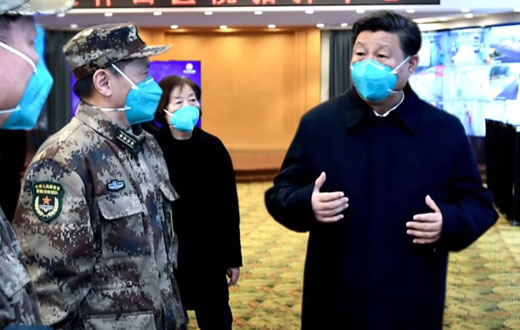FPI / May 15, 2020
Commentary by Jason Orestes
The U.S. continues to hemorrhage jobs and GDP as the coronavirus places the economy into a forced coma. Unemployment may temporarily approach Great Depression levels, and U.S. GDP may plummet by as much as 34 percent.

While mega corporations are permitted to remain open, deemed “essential” by some of the most unessential people you could fathom, small business is getting decimated.
Small businesses comprise 99 percent of U.S. companies (really), and 88 percent of these businesses have 20 employees or fewer. This unnecessary destruction of the heartbeat of America — behind policy that treated Arizona with the same pseudoscientific authoritarian rules as New York City — is a mistake that will be documented and discussed with contempt by history.
This is China’s fault.
While calls for debt defaults and forms of reparations mount against the Communist Party, their economy has also taken a hit from the virus originating out of Wuhan. After months of rampant denialism and subterfuge that resulted in the virus being exported to the rest of the world, China placed the clamps on Wuhan and other parts of the country to contain the outbreak.
This doesn’t do anything to fix the carnage rippling through America, but it may help to know that China is suffering a similar fate as the U.S. and the rest of the world.
Dozens of Chinese cities were placed on lockdown, resulting in the same kind of shutdown experienced in the U.S. This collapse of activity left no sector unscathed as retail sales fell over 20 percent in January and February, with fixed investment down by 25 percent and their industrial output down nearly 15 percent in the earlier part of the year. They’re still experiencing hardship as their Producer Price Index (measuring the prices factories charge wholesalers for products) fell by the largest number since 2016. This fall in price suggests diminishing demand and that manufacturers must lower their prices as a result.
The Chinese are chronic liars when it comes to accurate economic data, and it’s difficult to discern just how many have faced unemployment as a byproduct of the shutdown. Their official unemployment number typically fluctuates between 4-5 percent. However this figure spiked as high as 6.2 percent in February, a number that is likely materially understated.
Their unemployment data omits large numbers of people in rural areas and those that work in manufacturing and construction roles, a group that’s roughly 300 million in size. With these factored in, it’s estimated around 80 million were without work in early April. This equates to an unemployment number closer to 10 percent for those who should be working yet are without jobs.
Just as small business powers the U.S., China is no different. A whopping 60 percent of China’s GDP is derived from 30 million small and medium-sized businesses. These small businesses account for a massive 80 percent of China’s workforce and over half of the country’s tax revenue. China’s opacity makes it hard to know just how many of these businesses have closed, but suffice to say the coronavirus fallout is hitting these organizations in a very unpleasant way.
The Communist Party has maintained control over the world’s largest population for so long because it’s been able to manufacture economic growth and provide jobs that have lifted hundreds of millions of Chinese out of poverty. China’s economic expansion was already anemic before the pandemic, slowing since 2009 and at a 30-year low of 6.2 percent in 2019.
These shutdowns have resulted in a 6.8 percent decline in first quarter GDP for 2020. To provide context on the magnitude of this figure: this is China’s first economic contraction since 1976, the year Mao Zedong died. The first time they haven’t reported economic growth in some 44 years.
The CCP has stated it has to create 11 million new jobs annually to maintain social stability and keep its employment goals. These employment and GDP declines have caused the CCP’s chief administrative office to warn of “massive unexpected incidents”, meaning they’re acutely aware this employment destruction can quickly degenerate into social unrest and instability.
China’s global repercussions for its negligence, deceit, and incompetence remains to be seen, but it is already certainly paying a price at home like everyone else.
Jason Orestes (@market_noises) is a former Wall Street financial analyst who focuses on contemporary political developments affecting economics, markets, and culture. His work can also be found on financial publication TheStreet and Washington Examiner.
Intelligence Brief __________ Replace The Media
